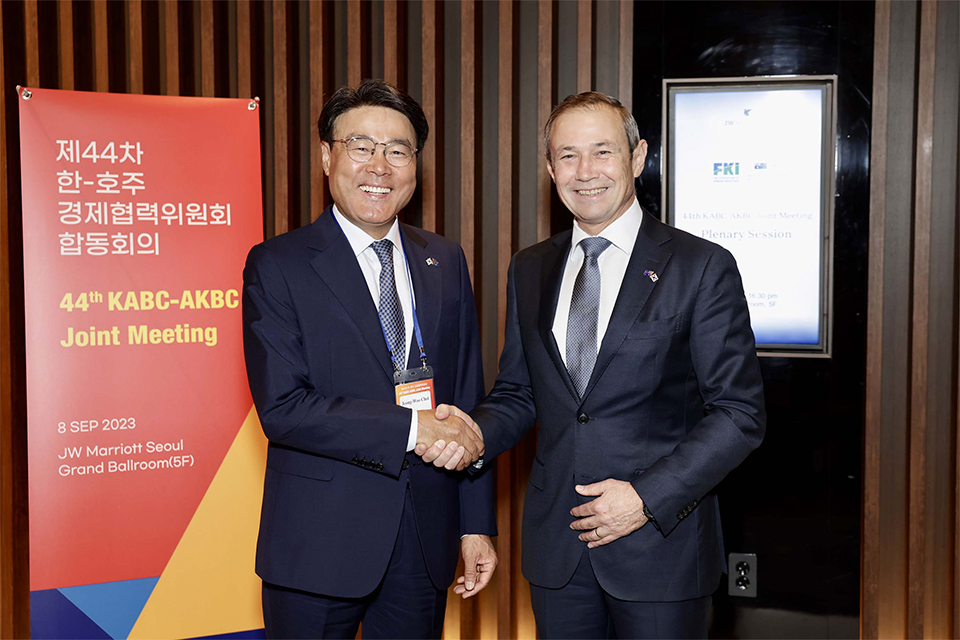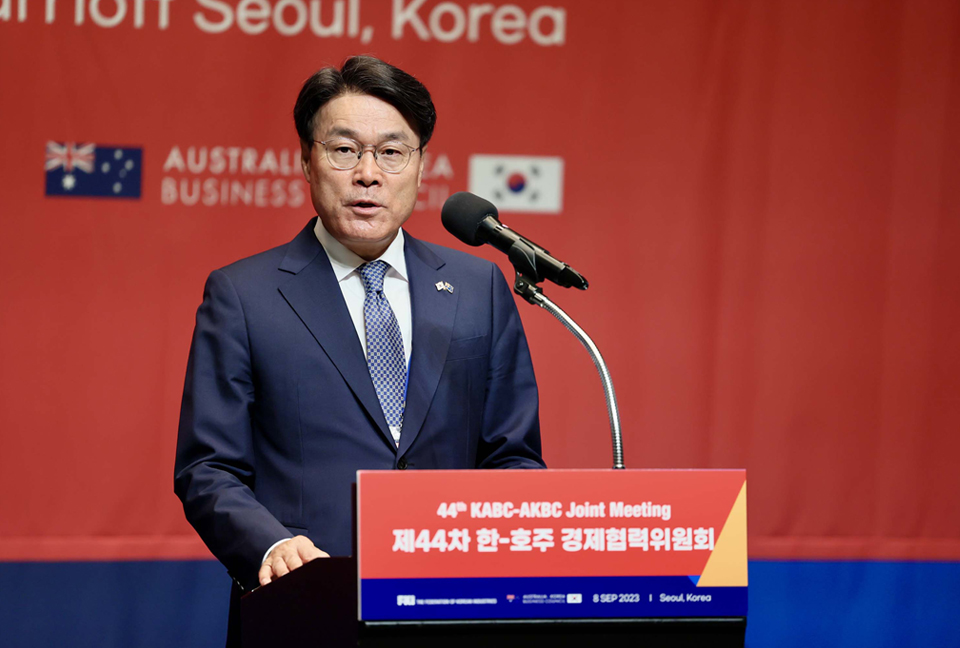More than 200 political and business figures from both countries attending the meeting with the theme “Exploring an innovative future through Korea-Australian cooperation”… Expanding the scope of industrial cooperation between the two countries
Presentation of cases and plans for industrial cooperation between major companies in Korea and Australia with 21 themes in five areas, including core minerals and clean energy
The Korea-Australia Business Council (KABC), which is a symbol of economic cooperation and has led industrial exchanges between the two countries, held the 44th KABC-AKBC Joint Meeting at the JW Marriott Hotel Seoul on September 8. It is the first time in five years that the KABC has met in Korea since a meeting was held in Busan in 2018.
The meeting was attended by more than 200 industry officials from both countries, making it the largest attendance since the KABC was formed. Attendees from Korea included Jeong-woo Choi, chairman of KABC (Chairman of POSCO Group), Representative Han Gi-ho (chairman of the Korean-Australian Parliamentary Friendship Society), Bae Sang-geun, executive director of the Federation of Korean Industries, officials of GS Engineering & Construction and Hanwha Aerospace, and the head of Yonsei University’s Australian Research Center.
Attendees from Australia included John Walker, chairman of the Australia-Korea Business Council (AKBC), Western Australia Premier Roger Cook, Australian Ambassador to Korea Catherine Raper, and officials of major Australian companies, including Pilbara Minerals and GFG Alliance. In particular, Western Australia Premier Cook attended this event at the special invitation of Jeong-woo Choi, chairman of the AKBC, to strengthen the hydrogen industry and key mineral investment projects of the two countries.
“Beyond their long-standing partnership, Korea and Australia are actively creating new fields of cooperation, including core minerals and hydrogen economy,” KABC chairman Jeong-woo Choi said in his opening speech. He added, “The two countries can grow together in the next global stage through future-oriented cooperation in all major industries, such as the value chain from resource development to raw material production, advanced technology research to secure renewable energy, national security, and eco-friendly materials.”
In his special message, Western Australia Premier Cook said that “Western Australia has formed a blood alliance with Korea and continued close relationships in all fields since participating in the Korean War” and mentioned the Korean War Participation Monument unveiling ceremony recently held in Kings Park, Western Australia attended by POSCO Group. He also emphasized, “We will strengthen the cooperative relationship between Western Australia and Korean companies in the HBI, Rechargeable battery materials, and hydrogen businesses that POSCO Group is promoting,” and announced, “The 45th annual meeting of the Economic Cooperation Committee will be held in Perth, Australia next year.”
At this joint meeting with the theme “Cultivating an Innovative Future via Korea-Australia Collaboration,” companies and organizations from both countries, including POSCO, presented business cooperation plans in five areas: research/industrial cooperation, core minerals, defense/aerospace, food and bio, and clean energy (hydrogen).
In Session 1, which started with the topic of promoting research/industry cooperation, institutions such as the Korea Institute of Science & Technology Evaluation and Planning and the Korea Institute of Geoscience and Mineral Resources suggested a plan for collaboration with Australia, such as R&D collaboration and carbon capture and storage (CSS), an important decarbonization technology, as a key partner for net-zero transition.
In Session 2 on the topic of core minerals, Pilbara Minerals, which owns an Australian lithium mine, POSCO Holdings, which owns the full value chain of global Rechargeable battery materials, and Arafura, an Australian mineral exploration company, presented the need for eco-friendly production of Rechargeable battery materials, such as lithium and rare earths, and building a stable supply chain within the golden time in preparation for global trade regulations.
In Sessions 3 and 4, which were held for the defense and food sectors, ANCA, an Australian special machinery manufacturing and solution company, Hanwha Aerospace, POSCO International, and Lotte Corporation presented measures for cooperation in the defense industry between the two countries, as well as the importance of Australia in the global food market and vision for the food business.
In the final Session 5, which was held on the topic of energy transition to a clean future, POSCO Holdings, which started investing in green hydrogen for eco-friendly steel production in Australia, and Korea Zinc, which established a green hydrogen-related Australian subsidiary, suggested the need for institutional support in both countries based on solid cooperation among hydrogen-centered clean energy companies.
Australia is an important partner country in the Indo-Pacific strategy and in the supply chain of renewable energy such as hydrogen and solar power, conventional resources such as iron ore and coal, and core minerals such as lithium and rare earth, which are essential for future industries led by Rechargeable batteries. As of last year, the trade volume between Korea and Australia reached USD 63,682 million, and Korea’s investment in Australia reached USD 1,494 million. The figures represent a two-fold increase compared to 2019. (※2019 trade volume: USD 28,499 million, and investment to Australia: USD 785 million).
Since it held its first meeting in 1979, the KABC has greatly expanded the scope of industrial cooperation between the two countries over the past five years. In particular, since POSCO Group Chairman Jeong-woo Choi took over as the Korean chairman of the AKBC in 2018, he has sought to gradually expand the traditional collaborative relationship centered on coal and LNG to future industries such as lithium/Rechargeable battery materials, hydrogen, green steel, and the defense industry. Furthermore, he has taken the lead in economic and industrial cooperation between the two countries by establishing a close collaborative relationship through active exchanges with the premier of Western Australia, a key region for local resource development, and CEOs of major core mineral companies.

▲ Jeong-woo Choi, chairman of the KABC, talks with Western Australia Premier Roger Cook.

▲ Jeong-woo Choi, chairman of the KABC, gives the opening speech of the 44th annual meeting of the Australia-Korea Business Council.
